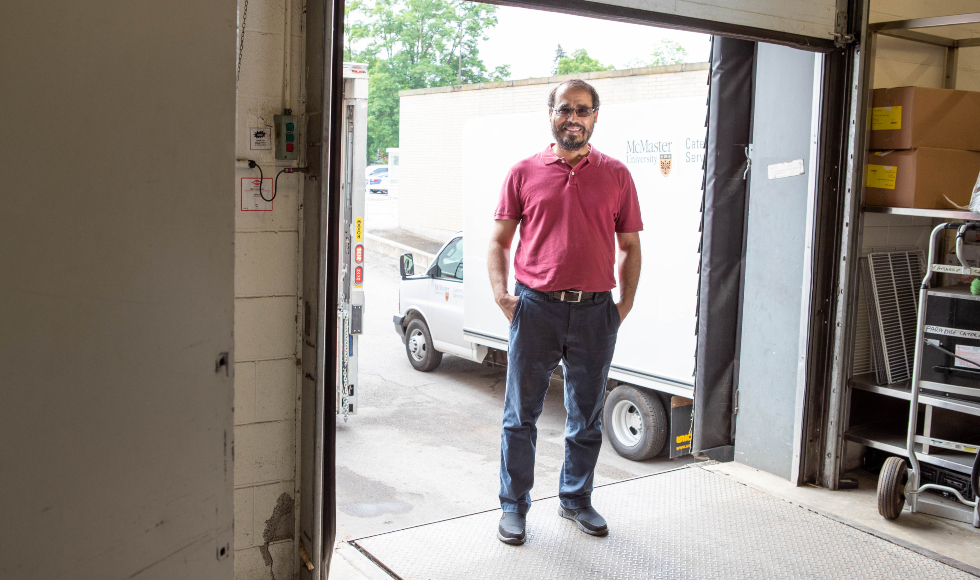Sustainable solutions and same-day delivery

BY Sonia Verma
December 10, 2020
“We’re looking at ways to reconcile economic development and growth with sustainability and community well-being.”
—Elkafi Hassini
The issue | The high cost of ‘free shipping’
“Free shipping, same-day delivery — they seem so convenient,” Elkafi Hassini says. “But is it really free? What is the true cost to our society?”
Even before the COVID-19 pandemic caused a dramatic surge in online shopping, a growing demand for same-day delivery was putting immense strain on communities, industry and the environment, Hassini says.
Unprecedented levels of freight traffic are heightening congestion, road wear, curbside parking and safety concerns in residential areas; industries need long-term solutions to meet the demand for same-day delivery; consumers pay higher prices as they absorb retailers’ added expenses.
And the emissions from delivery trucks and vans pose an environmental challenge, the impact of which has not been assessed fully.
Hassini, an expert on operations management and supply chain optimization, knows that transportation planning and policy tends to focus on moving people, not goods, especially in residential areas.
That means our roads, our neighbourhoods and our traffic laws are not set up to cope with thousands of delivery trucks criss-crossing and parking on our streets every day to deliver retail items to individuals in their homes.
More: Elkafi Hassini’s work exemplifies McMaster’s commitment to advancing the United Nations’ Sustainable Development Goals (SDGs).
Hassini heads the McMaster Smart Freight Centre, a partnership between McMaster and two other universities, as well as industry partners and the regional municipality of Peel, home to one of the country’s busiest transportation hubs.
His work involves finding solutions to make ecommerce logistics more efficient and sustainable, as well as kinder on those affected by it.
“How do we reconcile economic development and growth with environmental concerns, and the need to keep our communities safe and sustainable?”
The research | Last-mile delivery
Hassini and his interdisciplinary team are studying six “last-mile” aspects of ecommerce, which refers to the final stage of delivery, when a truck enters a neighbourhood.
In addition to studying the logistics and impact of ecommerce on the environment, traffic, neighbourhoods and municipal infrastructure, Hassini will also explore alternative delivery practices, such as using drones or creating local microhubs where people can pick up their online shopping.
The project has the support of the federal, provincial and municipal governments, as well as industry partners. In October, a new research initiative — CLUE: City Logistics for the Urban Economy — received more than $3 million from the Natural Sciences and Engineering Research Council of Canada to study challenges related to shipping and consumer expectations for same-day delivery.
The CLUE research collaboration is supported by three universities, six private-sector partners, four public sector partners and two non-governmental organizations.
The impact | Triple bottom line and sustainable solutions
The Smart Freight Centre’s goal is to use insights from its interdisciplinary, evidence-based research to enhance the triple bottom line: economic growth, environmental sustainability and an higher quality of life for residents.
“When the cities we live in were designed, ecommerce didn’t exist. But online shopping is here to stay, so our work could have implications for how the city of the future is designed.”
The Smart Freight Centre will also serve as a network between governments, academics and industry to support transportation needs and more sustainable infrastructure solutions.
“I see this as a project focused on not only improving transportation, but on linking the area to Canada and the world, and improving supply chain operations overall for global economic development.”
Lessons to share | More perspectives, clearer insights
Hassini, who started out as an industrial engineer, “at the intersection of engineering and business,” says bringing together experts from multiple disciplines is the key to finding well-rounded solutions that satisfy the triple bottom line.
Just as important is building relationships with industry partners, who can take researchers’ insights and innovations and help translate them into impactful action.
That’s why most of his projects — finding data-driven solutions for hospitals in crisis; working with local food banks and grocery stores to optimize food donations without hurting profits; food waste reduction using internet of things technology — are built on collaboration with experts and students from several fields, as well as industry.
“Working with students and colleagues from other disciplines lets me see things from a different perspective than the one I have in business, or from engineering. And the more perspectives you have, the better you’ll understand the matter.”
Elkafi Hassini’s work exemplifies McMaster’s commitment to advancing the United Nations’ Sustainable Development Goals (SDGs). Learn more about the best ways to align research with the UN’s SDGs.


